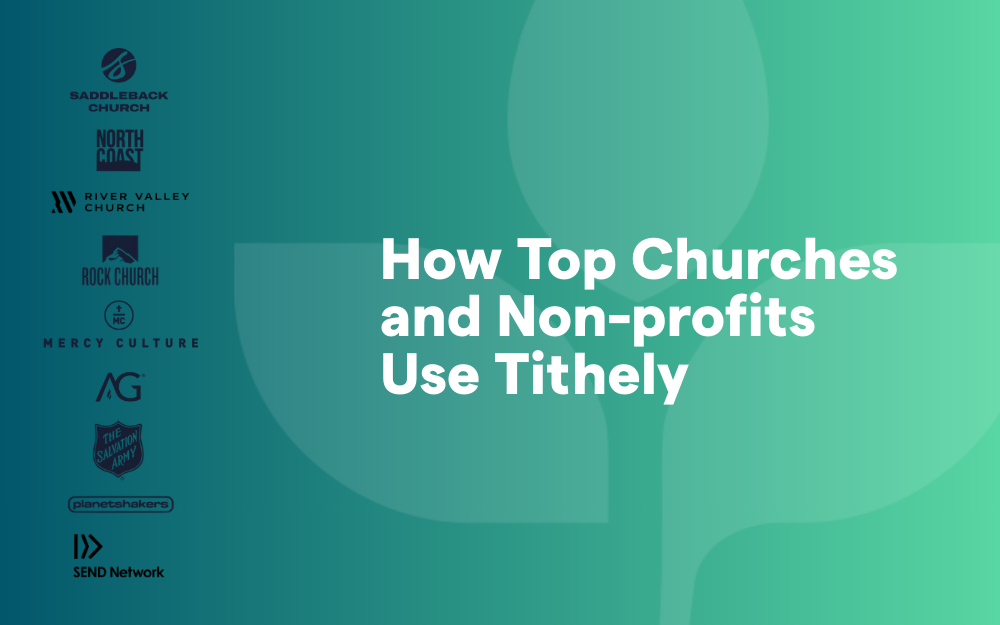Can I “Tithe” to Parachurch Organizations?

In 2016, according to a special report from Giving USA, it was reported that religious institutions received $122.94 billion in charitable donations. Among the donations tracked in this report, it does not include faith-based human service organizations like The Salvation Army, health care and education institutions, or international groups like World Vision, which means even more money was donated to religious organizations.
Now, when it comes to giving, many times people have a difficult time differentiating between the local church and parachurch organizations. In other words, as a Christian, is giving to a religious organization the same as giving to a local church?
Well, the answer to this question is a bit more complicated than replying with “Yes” or “No.” There is precedent in the Bible to give from what God has given you to the church, as well as to organizations who are motivated by the gospel and abide by biblical principles to do good work.
To help you think through the difference between the church and a religious organization (parachurch), here are five key things you need to know.
#1. A parachurch organization is not a church
A parachurch is not a church, hence the prefix para which means either “beside” or “by” in Greek. Local churches are responsible for preaching God’s Word, the faithful administration of the sacraments (i.e., baptism and the Lord’s Supper), and graciously administering discipline.
Supporting a parachurch organization is not the same as supporting the church. It’s more like supporting a particular cause that’s important to you, such as relief work (World Vision), evangelism (Cru), or Bible teaching (The Gospel Coalition).
#2. A parachurch should not act like a church
A parachurch should draw a distinct line between themselves and local churches. They are not the same, have different roles and responsibilities, and are not necessarily accountable to a local church unless they’re organized that way.
If a parachurch is organized for the sole purpose of providing Christian resources in the form of theological books, training events, and Sunday School material, this does not qualify them as a church.
If a parachurch organization provides relief support and monetary assistance, though a good thing, this does not make them a church.
#3. A parachurch is not a ministry of a church
A parachurch organization is not an extension of a church.
Though they may perform various services that churches do and can, this does not mean they’re a church. They’re a service provider with their own leadership, values, and beliefs.
#4. A parachurch protects the church
Parachurch organizations help protect the church, especially in matters pertaining to relief, development, and reform. For churches that don’t have the financial or personnel resources, parachurch organizations can assist these churches by allowing them to fulfill their unique role
#5. A parachurch should not pressure local churches
Parachurch organizations should not pressure local churches to focus their time and resources outside of their particular functions.
Many churches can provide relief to their members and community, but they may not have the financial or personnel resources, let alone the skill and training to provide more than monetary or temporary relief.
Parachurch organizations can encourage local churches to fulfill their unique role by coming alongside of them by assisting in these areas and providing individuals and churches an organization to participate with so that they can effectively serve their community.
Your turn
In general, it is a good rule of thumb to direct your giving to the local church, but to make room in what you’re able to give to religious organizations (parachurch) that fit the criteria above.
Do you agree or disagree? Share your thoughts in the comments below.
Sign Up for Product Updates
In 2016, according to a special report from Giving USA, it was reported that religious institutions received $122.94 billion in charitable donations. Among the donations tracked in this report, it does not include faith-based human service organizations like The Salvation Army, health care and education institutions, or international groups like World Vision, which means even more money was donated to religious organizations.
Now, when it comes to giving, many times people have a difficult time differentiating between the local church and parachurch organizations. In other words, as a Christian, is giving to a religious organization the same as giving to a local church?
Well, the answer to this question is a bit more complicated than replying with “Yes” or “No.” There is precedent in the Bible to give from what God has given you to the church, as well as to organizations who are motivated by the gospel and abide by biblical principles to do good work.
To help you think through the difference between the church and a religious organization (parachurch), here are five key things you need to know.
#1. A parachurch organization is not a church
A parachurch is not a church, hence the prefix para which means either “beside” or “by” in Greek. Local churches are responsible for preaching God’s Word, the faithful administration of the sacraments (i.e., baptism and the Lord’s Supper), and graciously administering discipline.
Supporting a parachurch organization is not the same as supporting the church. It’s more like supporting a particular cause that’s important to you, such as relief work (World Vision), evangelism (Cru), or Bible teaching (The Gospel Coalition).
#2. A parachurch should not act like a church
A parachurch should draw a distinct line between themselves and local churches. They are not the same, have different roles and responsibilities, and are not necessarily accountable to a local church unless they’re organized that way.
If a parachurch is organized for the sole purpose of providing Christian resources in the form of theological books, training events, and Sunday School material, this does not qualify them as a church.
If a parachurch organization provides relief support and monetary assistance, though a good thing, this does not make them a church.
#3. A parachurch is not a ministry of a church
A parachurch organization is not an extension of a church.
Though they may perform various services that churches do and can, this does not mean they’re a church. They’re a service provider with their own leadership, values, and beliefs.
#4. A parachurch protects the church
Parachurch organizations help protect the church, especially in matters pertaining to relief, development, and reform. For churches that don’t have the financial or personnel resources, parachurch organizations can assist these churches by allowing them to fulfill their unique role
#5. A parachurch should not pressure local churches
Parachurch organizations should not pressure local churches to focus their time and resources outside of their particular functions.
Many churches can provide relief to their members and community, but they may not have the financial or personnel resources, let alone the skill and training to provide more than monetary or temporary relief.
Parachurch organizations can encourage local churches to fulfill their unique role by coming alongside of them by assisting in these areas and providing individuals and churches an organization to participate with so that they can effectively serve their community.
Your turn
In general, it is a good rule of thumb to direct your giving to the local church, but to make room in what you’re able to give to religious organizations (parachurch) that fit the criteria above.
Do you agree or disagree? Share your thoughts in the comments below.
podcast transcript
In 2016, according to a special report from Giving USA, it was reported that religious institutions received $122.94 billion in charitable donations. Among the donations tracked in this report, it does not include faith-based human service organizations like The Salvation Army, health care and education institutions, or international groups like World Vision, which means even more money was donated to religious organizations.
Now, when it comes to giving, many times people have a difficult time differentiating between the local church and parachurch organizations. In other words, as a Christian, is giving to a religious organization the same as giving to a local church?
Well, the answer to this question is a bit more complicated than replying with “Yes” or “No.” There is precedent in the Bible to give from what God has given you to the church, as well as to organizations who are motivated by the gospel and abide by biblical principles to do good work.
To help you think through the difference between the church and a religious organization (parachurch), here are five key things you need to know.
#1. A parachurch organization is not a church
A parachurch is not a church, hence the prefix para which means either “beside” or “by” in Greek. Local churches are responsible for preaching God’s Word, the faithful administration of the sacraments (i.e., baptism and the Lord’s Supper), and graciously administering discipline.
Supporting a parachurch organization is not the same as supporting the church. It’s more like supporting a particular cause that’s important to you, such as relief work (World Vision), evangelism (Cru), or Bible teaching (The Gospel Coalition).
#2. A parachurch should not act like a church
A parachurch should draw a distinct line between themselves and local churches. They are not the same, have different roles and responsibilities, and are not necessarily accountable to a local church unless they’re organized that way.
If a parachurch is organized for the sole purpose of providing Christian resources in the form of theological books, training events, and Sunday School material, this does not qualify them as a church.
If a parachurch organization provides relief support and monetary assistance, though a good thing, this does not make them a church.
#3. A parachurch is not a ministry of a church
A parachurch organization is not an extension of a church.
Though they may perform various services that churches do and can, this does not mean they’re a church. They’re a service provider with their own leadership, values, and beliefs.
#4. A parachurch protects the church
Parachurch organizations help protect the church, especially in matters pertaining to relief, development, and reform. For churches that don’t have the financial or personnel resources, parachurch organizations can assist these churches by allowing them to fulfill their unique role
#5. A parachurch should not pressure local churches
Parachurch organizations should not pressure local churches to focus their time and resources outside of their particular functions.
Many churches can provide relief to their members and community, but they may not have the financial or personnel resources, let alone the skill and training to provide more than monetary or temporary relief.
Parachurch organizations can encourage local churches to fulfill their unique role by coming alongside of them by assisting in these areas and providing individuals and churches an organization to participate with so that they can effectively serve their community.
Your turn
In general, it is a good rule of thumb to direct your giving to the local church, but to make room in what you’re able to give to religious organizations (parachurch) that fit the criteria above.
Do you agree or disagree? Share your thoughts in the comments below.
VIDEO transcript
In 2016, according to a special report from Giving USA, it was reported that religious institutions received $122.94 billion in charitable donations. Among the donations tracked in this report, it does not include faith-based human service organizations like The Salvation Army, health care and education institutions, or international groups like World Vision, which means even more money was donated to religious organizations.
Now, when it comes to giving, many times people have a difficult time differentiating between the local church and parachurch organizations. In other words, as a Christian, is giving to a religious organization the same as giving to a local church?
Well, the answer to this question is a bit more complicated than replying with “Yes” or “No.” There is precedent in the Bible to give from what God has given you to the church, as well as to organizations who are motivated by the gospel and abide by biblical principles to do good work.
To help you think through the difference between the church and a religious organization (parachurch), here are five key things you need to know.
#1. A parachurch organization is not a church
A parachurch is not a church, hence the prefix para which means either “beside” or “by” in Greek. Local churches are responsible for preaching God’s Word, the faithful administration of the sacraments (i.e., baptism and the Lord’s Supper), and graciously administering discipline.
Supporting a parachurch organization is not the same as supporting the church. It’s more like supporting a particular cause that’s important to you, such as relief work (World Vision), evangelism (Cru), or Bible teaching (The Gospel Coalition).
#2. A parachurch should not act like a church
A parachurch should draw a distinct line between themselves and local churches. They are not the same, have different roles and responsibilities, and are not necessarily accountable to a local church unless they’re organized that way.
If a parachurch is organized for the sole purpose of providing Christian resources in the form of theological books, training events, and Sunday School material, this does not qualify them as a church.
If a parachurch organization provides relief support and monetary assistance, though a good thing, this does not make them a church.
#3. A parachurch is not a ministry of a church
A parachurch organization is not an extension of a church.
Though they may perform various services that churches do and can, this does not mean they’re a church. They’re a service provider with their own leadership, values, and beliefs.
#4. A parachurch protects the church
Parachurch organizations help protect the church, especially in matters pertaining to relief, development, and reform. For churches that don’t have the financial or personnel resources, parachurch organizations can assist these churches by allowing them to fulfill their unique role
#5. A parachurch should not pressure local churches
Parachurch organizations should not pressure local churches to focus their time and resources outside of their particular functions.
Many churches can provide relief to their members and community, but they may not have the financial or personnel resources, let alone the skill and training to provide more than monetary or temporary relief.
Parachurch organizations can encourage local churches to fulfill their unique role by coming alongside of them by assisting in these areas and providing individuals and churches an organization to participate with so that they can effectively serve their community.
Your turn
In general, it is a good rule of thumb to direct your giving to the local church, but to make room in what you’re able to give to religious organizations (parachurch) that fit the criteria above.
Do you agree or disagree? Share your thoughts in the comments below.



























